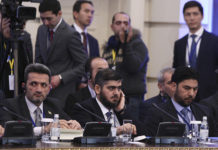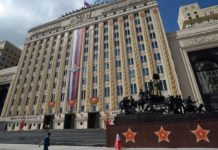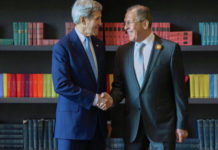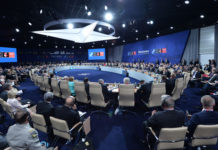Conflict in Afghanistan becomes one of the main irritants in relations between Russia and the us
The conflict in Afghanistan that moved Russia and the US closer to each other at the beginning of the 2000s forced them to act as situational allies. Now it is becoming one of the main irritants in relations of the two super powers again.
The conflict in Afghanistan that moved Russia and the US closer to each other at the beginning of the 2000s forced them to act as situational allies. Now it is becoming one of the main irritants in relations of the two super powers again. Statement of Director of the Foreign Intelligence Service Sergei Naryshkin became a new confirmation of this. He accused the US of “demonstration of force not coordinated with anyone.” In such way he characterized the recent use of the super powerful “mother of all bombs by Pentagon in Afghanistan. Washington also states more serious accusations to Moscow saying that it “destabilizes the situation in Afghanistan” allegedly selling weapons to Talibs against which the government in Kabul and the international coalition headed by the US are fighting.
The war of words between Moscow and Washington that started after use of the super powerful bomb by American military in Afghanistan and accusation of Russia of secret supply of weapons to Talibs became one of the central tropic of the sixth international security conference that ended in Moscow.
Director of the Foreign Intelligence Service Serge Naryshkin summed up the numerous harsh statements of Russian representatives before closing of the forum. Naryshkin confirmed existence of serious disputes between Moscow and the new US Administration with regard to the Afghan conflict.
Speaking about use of the “mother of all bombs” by American military in Afghanistan that according to the version of Pentagon had to deliver a strike on militants of Islamic State group (IS, prohibited in Russia), Naryshkin expressed his doubt that this action would achieve the declared goals. He announced, “All that we see in Afghanistan so far are facts of demonstration of forces similar to explosion of the super powerful bomb not coordinated with anyone.”
In turn, Foreign Minister Sergei Lavrov who opened the Moscow conference accused the American military of “spreading of deceitful unprofessional statements,” having parried the accusations addressed to Moscow that it allegedly supplied weapons to Talibs secretly.
In his speech head of the Main Intelligence Directorate (GRU) of the General Staff Igor Korobov accused Americans saying that they did not defeat the terrorists in Afghanistan and staying in this country for many years actually “left the Afghans face to face with difficult internal political problems, destroyed economy, undeveloped social sector and drug trafficking that grew tremendously.” Having reminded that not only Taliban movement but also IS militants fought against the central government of Afghanistan now. Korobov reported that more than 10,000 servicemen and more than 11,000 civilians died in Afghanistan in 2016.
Head of GRU admitted that situation in Afghanistan would not be normalized in the near future but answering the question of Director of CAST Ruslan Pukhov if it made sense to increase military aid and to broaden support of the authorities in Kabul in the current situation, said that Russia had always supported the central government in Afghanistan and would do this in the future. Along with this, Korobov reproached Americans and their allies that they, “declaring how dangerous it is to leave the Afghan government tete-a-tete with the extremists take measures for preserving of their military presence (in Afghanistan) for a long term.”
Several steps taken by the White House and Pentagon in the Afghan direction lately contributed to an abrupt change of the tone of the recently quiet and generally reconciliation statements of Russian officials addressed to American colleagues.
Thus, new US Secretary of State Rex Tillerson who had the first visit to Moscow did not accept an invitation to send American representatives for participation in the international conference on Afghanistan held in Moscow on April 14. Along with this, use of the super powerful bomb by Pentagon happened on the day of opening of the conference that Washington ignored considering it an unimportant event.
After that, advisor to the US President for national security General Herbert McMaster and new Secretary of Defense James Mattis visited Kabul with an interval of a few days. They accused Moscow of secret supply of weapons to the Talibs fighting against the government in Kabul. Commander of the US and NATO forces General John Nicholson joined these accusations.
Thus, in less than 100 days after coming of Donald Trump to office his Afghan agenda is practically fully formed by the generals who have the harshest stance towards Moscow. Not a single representative of the previous administration in Washington stated such serious claims against Russia as secret support of Talibs, whereas cooperation with Moscow during the office of President Obama had been important for the coalition of the US and NATO in Afghanistan.
Refusal of US and NATO representatives to participate in the international security conference, another forum held under the aegis of Moscow, became a new sign of growing crisis of confidence between Russia and the US about Afghanistan.














